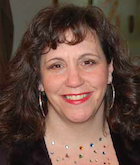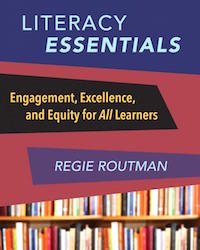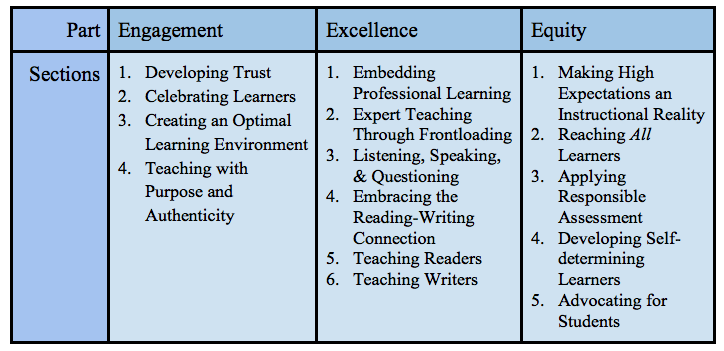Literacy Essentials for All of Our Learners
Literacy Essentials: Engagement, Excellence, and Equity for All Learners
By Regie Routman
(Stenhouse Publishers, 2018 – Learn more)

Every teacher who works with students on reading and writing must have this book. No joke. Not overstating. Literacy Essentials: Engagement, Excellence, and Equity for All Learners is that good. Order it right now.

Teacher to Teacher
Routman is a teacher’s teacher. Despite her many years as a consultant, she remains one of us. She is grounded, realistic and honest in her books – likely due to the large amounts of time she continues to spend in real classrooms working with real students.
She says, “my most joyful work – and when I feel most at one with myself – is when I am working with students” (p.1). She also talks about “savoring the teaching process” (p. 2), music to the ears of edu-dorks like me.
Reading Routman often feels like talking with a really awesome teacher across the hall. You know, the one who is always willing to share, help, and be your sounding board. Because her messages for how to grow the literary lives of our students are so pointed and simple, I was inspired to share them with the actual teachers across the hall.
She wrote this book, Routman tells her readers, to share what she’s learned and help us “simplify teaching, raise expectations, and make expert teaching possible for all of us” (p. 1). Throughout Literacy Essentials she shares her tried and true, evidence-based beliefs, ideas, methods, strategies, and opinions freely. It is refreshing that she does not take an “all-or-nothing,” “ you should always,” “all or nothing,” or “never do that” tone with her readers.
Routman is always respectful and does not come across as dogmatic about her beliefs. She clearly continues to study and reflect on her practices while staying wide open to new ideas. In turn, her intellectually and professionally curious vibe truly invites readers to think about what she is saying.
Reading the Book
Literacy Essentials is long. But don’t let that scare you. I read it cover to cover and enjoyed every page, but it does not have to be read that way. As Routman explains, “The book is organized for deep reading or for dipping in and out of the many issues” (p. 2), The table of contents and index are both very usable, and readers can scan either resource to pinpoint areas of professional need.
There are three main parts: Engagement, Excellence, and Equity. All three, Routman points out, are integral to successful literacy learning. Engagement focuses on creating culture and climate for optimal literacy learning. Excellence offers the basics of teaching English language arts. Equity looks at how we ensure that ALL learners get a quality literacy education.
Having always believed that quality public education is a civil rights issue, I find it affirming and inspiring to see equity and engagement on equal footing within the basic tenets of teaching literacy!
The engagement, excellence, and equity parts of the book are further divided into four to six sections. See the box below for section listings.
Each section is filled with topics that include suggestions, ideas for “taking action,” and often an illustrative story from Routman’s life.
A Deeper Peek
“Make Independent Reading a First Priority” (p. 204) is a topic under the Teaching Readers section in the Excellence part of the book. Routman starts it by sharing one of her most popular tweets, “Make daily indep[endent] reading #1 priority & work backwards from there. Use think aloud, guided read, shared read to support that end” (p. 204). She then writes, in narrative form, about the what’s and why’s of independent reading reading over the space of a page and a half.
She reminds teachers that independent reading must be more than just setting aside time and letting kids loose. Students must be taught to choose just-right books (that is, books they can and want to read) and to self-monitor for comprehension. A teacher’s role during independent reading time is to conduct one-on-one conferences with students to help them learn both of those skills and to discuss and enjoy texts.
The Take Action ideas for this topic are simple and very easy to implement. Each offers a single sentence summary and then a short narrative with concrete examples. Among them are the following gems.
- Teach students to self-select books.
- Value massive quantities of free reading.
- Promote audio texts.
- Allow for student choice.
- Limit rewards for reading.
The Equity part of the book includes the section Reaching All Learners. Here one topic explores how to “Instill Determination to Learn” (p. 282). In the narrative introduction to the topic, Routman makes the point that students must be coached to believe in themselves and see themselves as capable and desirous of meeting high academic expectations.
Take Action ideas in this section include:
- Listen to students and get to know them.
- Inspire life and learning passions.
- Embrace our mistakes.
- Help students believe they can succeed.
- Differentiate instructional approaches.
The topic ends with a touching story about Routman learning that a dear friend has dementia and how hard it was to think of the woman not being known by her caregivers.
A Balance of Joy, Kindness and High Expectations
What stands out most to me in Literacy Essentials is Routman’s honesty and her willingness to help teachers think about how to balance joy, high expectations, and student accountability. A prime example are her assertions that quality handwriting (p. 248), correct spelling (p. 240), and generally expecting students to work hard matter very much in the writing process and in learning generally. She writes, “I believe one of the gravest educational injustices is how little we expect from our underserved schools and students” (p. 259).
Routman passionately calls for us the raise the bar for our students but to do it from a place of respect, nurturing, and love. Most practicing teachers I encounter believe that joyful learning can and should go hand-in-hand with high expectations for quality work, but we often don’t hear that message from our scholars. Sometimes the focus seems so heavily on allowing for choice, creativity, and fun that the idea of students being accountable for learning can seem lost. Reading Routman’s take was comforting and exciting.
Who and How
At the beginning of this review I suggested that every teacher get a copy of Literacy Essentials. I stand by that recommendation. There are, however, some groups that might benefit even more than others. Principals, literacy leaders, literacy coaches and consultants, interventionists (or Title 1 teachers), English language arts teachers, and professional learning community (PLC) facilitators will find Literacy Essentials to be invaluable.
It is as close to perfect a tool as I’ve seen to use as a part of ongoing professional development for literacy practitioners and leaders. Each section is a self-contained study module and yet also connects to the whole of the book. Stenhouse Publishers even offers a free study guide for Literacy Essentials. And you don’t have to take my word for any of this – click on the book cover at the Stenhouse page and preview the entire book yourself.
Professional Trust
In a 2014 interview with Larry Ferlazzo, Routman said,
Professional trust means that teachers and leaders at a school can depend on each other, that everyone on staff is fully committed to all students… Professional trust only exists where teachers and leaders are highly knowledgeable about all aspects of literacy and learning and where the staff has developed shared beliefs that align across grade levels with best practices and current research. In my experience, a trusting and knowledgeable culture does not develop without ongoing, relevant Professional Literacy Communities (PLCs) where teachers and leaders study and collaborate to improve teaching and learning across a whole school.“
My experience over 22 years serving as a school-based literacy teacher, learner, and leader leads me to agree. I have the highest professional trust for Regie Routman and am deeply grateful that she shares her knowledge with the wider professional learning community.
If you want your all of your students to love reading and writing and all to be excellent readers and writers, this book will inspire, teach, gently cajole, and just generally help you move your literacy teaching forward in service of these goals.
_______________
Rita Platt (@ritaplatt) is a National Board Certified teacher with master’s degrees in reading, library, and leadership. Her experience includes teaching learners in remote Alaskan villages, inner cities, and rural communities. She currently is a teacher-librarian, teaches graduate courses for the Professional Development Institute, writes for We Teach We Learn, and blogs at MiddleWeb’s Heart of the School.




































Rita, good review. This book sounds like a “must-read!”
It is, Mary! It is the best!